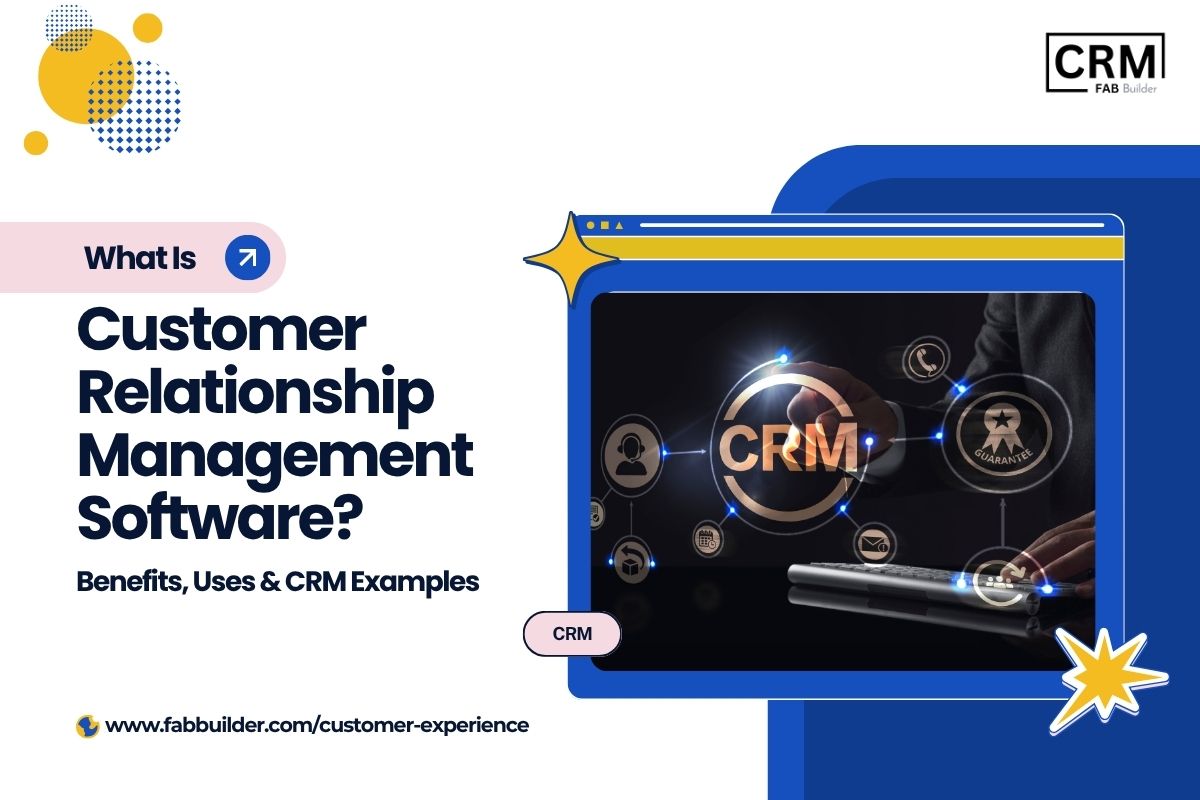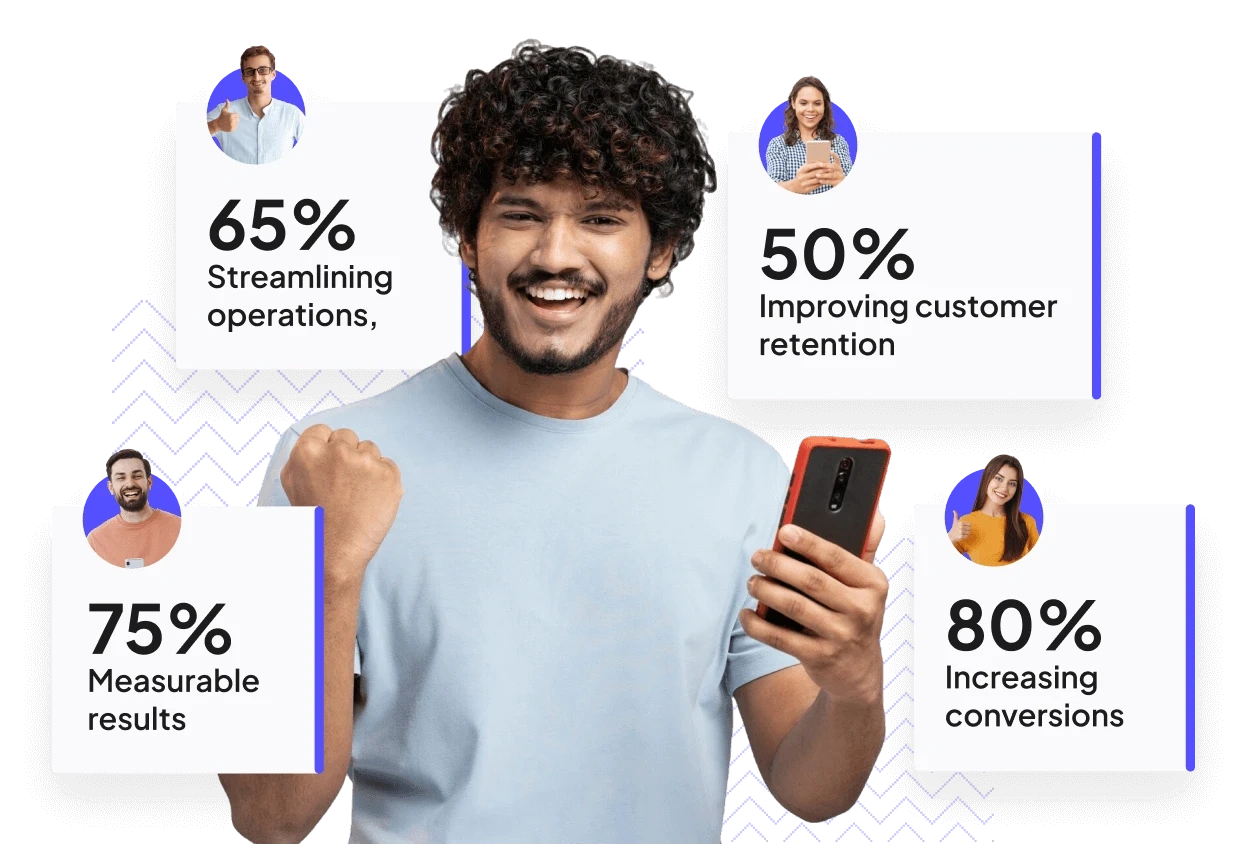Struggling to manage leads, track customer interactions, or keep your sales team on the same page? You’re not alone. Many businesses lose opportunities every day because customer information is scattered across spreadsheets, emails, and multiple tools. That’s where CRM software comes in.
But what exactly is a CRM application, and how can it transform the way your business interacts with customers? In this guide, we’ll break down what CRM software is, its key features, uses, types, and benefits, plus share real-world examples of how businesses are leveraging CRM systems to boost sales, streamline support, and improve customer satisfaction. Whether you’re a small business owner, sales manager, or marketing professional, this guide will help you understand how to choose the right CRM software and maximize its impact.
What Is Customer Relationship Management (CRM) Software
Customer relationships are the backbone of any successful business. But managing leads, tracking interactions, and ensuring consistent follow-ups can be challenging without the right tools. That’s where Customer Relationship Management (CRM) software comes in.
A CRM system centralizes all customer data, automates sales and marketing processes, and provides insights that help businesses improve relationships and drive revenue. From tracking emails and calls to monitoring deals and campaigns, a CRM application ensures your team has the right information at the right time.
What Is the Main Purpose of a CRM System?
The main purpose of a CRM system is to streamline customer interactions, improve sales efficiency, and boost customer satisfaction.
Businesses often struggle with scattered data, missed follow-ups, and inconsistent communication. A CRM solves these problems by:
- Centralizing customer information
- Automating sales, marketing, and support tasks
- Tracking leads and deals from initial contact to conversion
- Providing analytics for smarter decision-making
With built-in sales automation and pipeline tracking, teams can prioritize high-value leads and reduce manual errors, ultimately increasing revenue and customer retention.
What Are the Key Features of CRM Software?
Top features of modern CRM software include:
- Contact & Lead Management: Keep track of prospects and existing customers in one place.
- Sales Pipeline & Deal Tracking: Visualize your sales stages and monitor progress.
- Marketing Automation: Send targeted campaigns and track engagement.
- Customer Support & Ticketing: Efficiently manage support requests.
- Analytics & Reporting: Generate insights on sales performance, marketing ROI, and customer trends.
- Workflow Automation: Reduce repetitive tasks and automate reminders.
- Multi-Channel Integration: Connect emails, WhatsApp, social media, and more.
What Are the Different Types of CRM Software
CRM systems are designed to meet different business needs, and they can generally be categorized into three main types. Understanding these types will help you choose the CRM that aligns best with your business goals.
- Operational CRM: Operational CRM focuses on streamlining and automating your sales, marketing, and customer support processes. It helps businesses manage leads, track opportunities, schedule follow-ups, and automate repetitive tasks. By organizing workflows efficiently, operational CRM ensures that your sales and support teams spend more time building relationships and closing deals rather than managing data manually.
- Analytical CRM: Analytical CRM is all about making data-driven decisions. This type of CRM collects and analyzes customer data, providing insights into purchasing behavior, engagement trends, and sales performance. Businesses can use these insights to optimize marketing campaigns, predict sales outcomes, and identify opportunities for upselling or cross-selling. Analytical CRM transforms raw data into actionable intelligence, helping companies make smarter strategic decisions.
- Collaborative CRM: Collaborative CRM is designed to improve communication and collaboration across departments. It ensures that sales, marketing, and customer support teams can share information seamlessly, such as customer interactions, notes, and support tickets. This shared visibility creates a unified view of each customer, reduces miscommunication, and enhances the overall customer experience. Collaborative CRM is especially valuable for larger organizations or teams working across multiple locations.
Choosing the right type of CRM depends on your business needs. For instance, small businesses looking to automate sales might prioritize operational CRM, while enterprises aiming for data-driven strategies may focus on analytical CRM. Many modern CRM platforms, like FAB CRM, combine all three types into a single solution, offering automation, analytics, and collaboration in one platform.
Top CRM Software to Consider in 2025
The CRM market is constantly evolving, with new features, AI-powered tools, and automation capabilities reshaping how businesses manage customer relationships. Choosing the right CRM can significantly impact your sales efficiency, customer satisfaction, and overall business growth. Here are some of the top CRM software options to consider in 2025:
- Salesforce: Salesforce is one of the most widely adopted CRM platforms globally, especially among enterprise organizations. It offers advanced customization, powerful analytics, and a comprehensive suite of sales, marketing, and support tools. Its scalability makes it perfect for large teams managing complex customer pipelines. Salesforce also supports numerous integrations with third-party apps, making it highly versatile.
- FAB CRM: A next-generation, AI-driven CRM designed for businesses of all sizes, FAB CRM offers robust multi-channel integration, predictive lead scoring, and workflow automation. It helps sales and marketing teams prioritize high-value leads, streamline communication, and gain actionable insights to boost conversions. FAB CRM is ideal for businesses looking for a scalable solution that combines automation, analytics, and collaboration in one platform.
- HubSpot CRM: HubSpot CRM is popular among small to medium-sized businesses due to its easy onboarding and free plan. It offers intuitive dashboards, contact and deal tracking, and marketing automation. HubSpot also provides in-depth educational resources, making it simple for teams to adopt quickly and start managing customer relationships efficiently.
- Zoho CRM: Zoho CRM is an affordable and flexible solution, known for its customizable modules and automation features. Businesses can tailor Zoho CRM to fit their unique sales processes, from managing leads and contacts to tracking campaigns and generating analytics reports. Its cost-effectiveness and scalability make it ideal for growing businesses.
- Microsoft Dynamics 365: Microsoft Dynamics 365 is an enterprise-grade CRM solution with deep analytics and integration capabilities. It combines CRM and ERP functionalities, providing a unified view of customer data and operational insights. Dynamics 365 is suitable for businesses looking to leverage data-driven strategies, improve collaboration, and automate processes across multiple departments.
How Do Businesses Use CRM Software to Boost Sales and Improve Support?
Businesses use CRM software to:
- Track Leads: Ensure every opportunity is followed up promptly.
- Automate Sales Tasks: Reduce manual work and allow sales reps to focus on closing deals.
- Enhance Customer Support: Resolve tickets faster and maintain high satisfaction.
- Analyze Customer Behavior: Tailor marketing and support strategies based on data insights.
With FAB CRM, a marketing team can segment leads, run targeted campaigns, and track engagement, resulting in higher conversion rates.
What Are the Benefits and ROI of Using CRM Software?
Implementing CRM delivers tangible results:
- Increase revenue per sales rep by ~41%
- Improve lead conversion rates by 20–25%
- Boost customer satisfaction by 23%
- Reduce time spent on manual tasks by 8 hours/week per employee
Businesses using FAB CRM often see ROI within 3–6 months, thanks to automation, pipeline visibility, and better customer tracking.
How Does CRM Software Work Step by Step?
CRM software operates in a structured process:
- Data Collection: Gather information from emails, calls, forms, and social media.
- Data Organization: Store and segment leads, contacts, and accounts.
- Automation: Set up reminders, follow-ups, and workflows.
- Analysis & Reporting: Monitor sales performance, customer engagement, and marketing ROI.
- Decision-Making: Use insights to optimize sales and marketing strategies.
What CRM Software Can’t Do for Your Business
While CRM software is powerful, it doesn’t guarantee success on its own. Limitations include:
- CRM can’t replace a poor sales strategy or an untrained team.
- It won’t automatically fix weak customer relationships.
- Data quality is critical — CRM can’t work with incomplete or inaccurate data.
- Adoption requires employee training and consistent use.
The software is only as effective as the strategy and processes behind it.
How to Choose the Best CRM Software for Your Business Needs
Consider these factors when selecting a CRM:
- Business Size & Growth Potential: Ensure scalability.
- Feature Requirements: Match CRM features to team needs.
- Ease of Use: Simple UI speeds adoption.
- Integration: Connects with existing tools (email, WhatsApp, social media).
- Cost & ROI: Look for measurable impact on sales and efficiency.
How Does CRM Enable Business Automation?
CRM enables automation by:
- Automatically assigning leads to sales reps
- Sending follow-up emails and reminders
- Triggering workflows based on customer actions
- Tracking campaigns and engagement metrics
- Reducing repetitive manual tasks for teams
Benefit: Automation ensures consistency, efficiency, and a better customer experience.
Conclusion: Why Your Business Needs CRM Software
Investing in the right CRM software isn’t just about managing contacts—it’s about transforming your business. From automating workflows and boosting sales efficiency to improving customer satisfaction and providing actionable insights, a CRM system like FAB CRM empowers teams to work smarter, not harder.
In today’s competitive market, businesses that leverage CRM tools effectively gain a clear advantage, turning leads into loyal customers and insights into results. Don’t let scattered data and missed opportunities hold your business back. Take control of your customer relationships today — start your free trial of FAB CRM or book a demo to see the difference for yourself!
Frequently Asked Questions
What is CRM software?
CRM (Customer Relationship Management) software is a tool that helps businesses manage, track, and optimize interactions with customers and prospects. It centralizes data, automates workflows, and provides actionable insights to improve sales, marketing, and customer support.
What are the key features of CRM software?
Key features include contact and lead management, sales pipeline tracking, marketing automation, customer support ticketing, analytics and reporting, workflow automation, and multi-channel integrations.
How does CRM software work?
CRM software collects customer data from multiple channels, organizes it into dashboards, automates repetitive tasks, tracks interactions, and generates insights to help teams make informed decisions.
What are the types of CRM software?
There are three main types:
- Operational CRM: Automates sales, marketing, and support processes.
- Analytical CRM: Provides data insights and reporting for strategic decisions.
- Collaborative CRM: Facilitates team collaboration and shared customer visibility.
How do businesses use CRM software?
Businesses use CRM software to manage leads, automate sales and marketing tasks, track customer interactions, enhance support, analyze customer behavior, and improve team collaboration.
What are the benefits and ROI of CRM software?
Benefits include increased lead conversion, improved customer satisfaction, higher revenue per sales rep, reduced manual tasks, and better decision-making through data-driven insights. ROI is often realized within 3–6 months.
Can CRM software automate business processes?
Yes. CRM software enables automation of lead assignment, follow-ups, reminders, workflows, and customer engagement campaigns, making business processes more efficient and consistent.
What CRM software should I choose for my business?
The right CRM depends on your business size, workflow, and goals. Look for a solution that offers essential features, ease of use, integration capabilities, scalability, and measurable ROI. Solutions like FAB CRM combine AI, automation, and multi-channel support for comprehensive business management.

